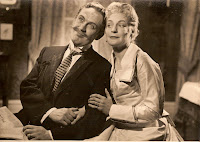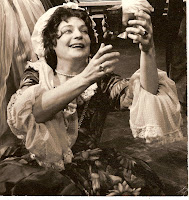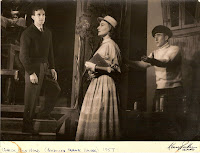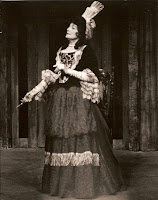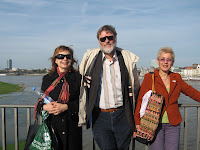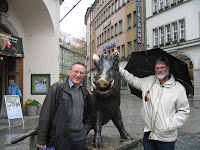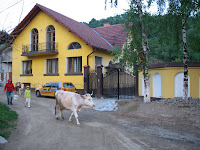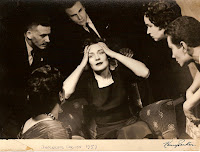
May, 2008
-
My mother of a thousand faces
May 30, 2008 by Christopher Buxton
 My mother, Monica Stewart, is a an actress. In her latest role – a one hander co written by God and Samuel Beckett (posthumously) – she is playing herself: dying.It is as ever an overwhelming performance and we who sit in the wings strive to understand its complexity.My mother who was never comfortable being herself now looks like a famine victim. Her eyes are permanently shut. Her arms are now her chief tools of expression, reaching out, grasping, pushing away. As if her deaf ears can now hear her family’s voices, she moves spasmodically – especially to poetry and song. Sometimes it seems she is feeling sharp pangs of pleasure or pain and her lips move as if trying to tell us something. But all that emerges is the occasional cry that baffles the audience and keeps them on the edge of their plastic seats over the two hours of visiting time.Mum, we want to know what is happening in that dark hallway you now inhabit. It is what every human wants to know. And it is why we take these hours as a performance – guessing, wishing, hoping.Dad has brought your pictures to the ward, and the nurses whisper in temporary respect. Look, Monica was an actress. What remarkable photos!Dad is the Director, now powerless to control the action. This quiet woman holds the centre of the stage.
My mother, Monica Stewart, is a an actress. In her latest role – a one hander co written by God and Samuel Beckett (posthumously) – she is playing herself: dying.It is as ever an overwhelming performance and we who sit in the wings strive to understand its complexity.My mother who was never comfortable being herself now looks like a famine victim. Her eyes are permanently shut. Her arms are now her chief tools of expression, reaching out, grasping, pushing away. As if her deaf ears can now hear her family’s voices, she moves spasmodically – especially to poetry and song. Sometimes it seems she is feeling sharp pangs of pleasure or pain and her lips move as if trying to tell us something. But all that emerges is the occasional cry that baffles the audience and keeps them on the edge of their plastic seats over the two hours of visiting time.Mum, we want to know what is happening in that dark hallway you now inhabit. It is what every human wants to know. And it is why we take these hours as a performance – guessing, wishing, hoping.Dad has brought your pictures to the ward, and the nurses whisper in temporary respect. Look, Monica was an actress. What remarkable photos!Dad is the Director, now powerless to control the action. This quiet woman holds the centre of the stage.
-
May 27, 2008 by Christopher Buxton

Flash – Bulgarian flat for sale in stunning Aitos
Just a couple of steps away from this central square, on a pedestrianised street is a flat with views of the mountains. The flat is on fifth floor of a brick built block with lift. It has a large living room, a bedroom, kitchen -breakfast room and bathroom. Entrance hall gives substantial storage space and there are two balconies – one very large.Aitos is a sleepy traditional town just twenty miles from Burgas and the seaside. It is ideal for commuting to the big city and returning to traffic free streets and peaceful shady walks. Just above the town there is a large natural park. And compared to the expense and crowded conditions in Burgas and the insecure situation of many village houses, this would make an ideal place to start your Bulgarian adventure.Price 35,000 eurosContact: anna.buxton@googlemail.com
-
Four Hours in KAT Purgatory
May 19, 2008 by Christopher Buxton
Help! I’m turning into Professor Vuchkov
I must stop moaning about life in my beloved Bulgaria
The German expressionist George Grosz has a painting of prisoners exercising in the gaol yard. Pale and flabby, eyes cast downwards, their shoulders weighed down with an awful resignation, they circle beneath a leaden sky, with no destination to lift their eyes or spirits. Their guards are no less trapped. They are part of this grey pointless Horo.And so to KAT! That man made purgatory where those wishing to drive a car in Bulgaria have to wait for hours in a succession of queues in front of low frosted windows that are seldom opened. Like Grosz’s prisoners we jostle with ever weakening resolve in a contracting space where queues collide and no-one is sure of the final outcome.Reaching the head of the first queue after an hour, at last we grovel at a low opening. We pray to every God and Kafka that we have been in the correct line. We scrabble in servile haste to provide the requested documentation, always in a panic lest some scrap of paper has been lost. Our backs bent, we twist our necks to understand the comments and instructions that are muttered by a scarcely visible clerk. At last a piece of paper is stamped and we are told to go to Window Number Five in a separate building.Outside a sun is shining. Half a mile and a world away People are stripping on the beach. Proud Grannies are parading new babies in the park. A teenager is experiencing a first kiss. Heads down, we rush to our next destination. Our progress is followed by the bored eyes of otherwise inactive police officers, who stand in silent groups, probably praying for some outbreak of lunacy, that will disturb the stultifying atmosphere.Window Number 5 has a crowd of people in front of it, everyone intensely aware of a notice informing us of an impending thirty minute rest-break. Those underpaid and overworked clerks, imprisoned behind their glass walls, are as much part of the demoralizing game as we who wait in queues for their attention.At Twelve o’clock, the frosted glass snaps shut almost removing our finger tips. We turn away with that feeling of every prisoner about to be returned from exercise yard to their cell. Somehow the outside world seems tainted and we hold on in our constricted space.Half an hour passes, with each slow second to be calculated like the euro to the lev. At last the glass snaps open with an impatience that brooks no small talk. Anonymous ringed hands shuffle our documents. A brisk stamp and we are sent to join the queue at the State bank counter. Every pleasure must be paid for. Here at least, in contrast to the KAT clerks, the tellers are visible in all their resentful discontent, like bored predators behind a clear glass barrier.In this queue, there is an opportunity to participate in a non verbal language lesson. Drop your head into your shoulders. Lift your bent arm and with your fingers loosely open rotate your hand two inches to the right of your mouth which is drawn downwards in an expressive pout. With this gesture you can convey the helplessness that every Bulgarian feels.Money finally paid, we are sent to Window number 4. There, we encounter a restless milling group that fills the narrow corridor. There is no queue as it is unclear which of the two closed frosted windows will open as number 4. Something more important than a coffee break must be engaging the clerks on the other side of Alice’s frosted mirror. We can only imagine a fascinating and important discussion taking place between Michka and Kichka about the relative failings of their daughters- in- law, Tonka and Donka, and the ailments of their mothers Tinka and Binka.A young man, who has shifted from one foot to the other in paroxysms of anxiety, at last plucks up the courage to rap his knuckles on the glass. There is a scream of outrage and one of the windows shoots back. An angry voice demands to know who has dared to knock on the window. Clearly fearing that he will be turned into a toad, the young man gabbles his question. Is he in the right queue? No of course he isn’t. He retires in confusion and the rest of us are warned of the dire consequences of daring to knock again. The window slams shut.Half an hour passes. Kichka, bored at last by Michka’s endless complaining finds that some completed documents have arrived on her desk. The window shoots back. Two names are called. The lucky pair depart. Another half hour and our bladders are bursting. Someone says there is a toilet just a few feet down the opposite corridor.However in this looking glass world, the open corridor door bears the legend “Entrance to outside persons strictly forbidden.” Yes the toilet is available to the public but instead of crossing the few feet of corridor, we have to leave the main building, pass through the hangar sized garage and re-enter the corridor through someone’s private office in order to reach the sure fire contender for the coveted title of dirtiest toilet in the Balkans.There is no lock on the door – no doubt to discourage those who have acquired the explicable desire to cut their wrists in their long wait for documentation.Back at Window Number 4, a tall slim Russian goddess is talking urgently in English to a plump stumpy westie. It turns out that they are in the wrong queue and they have to return through the hangar garage. Their Mercedes is now fifteenth in line. The hangar presents a tableau of tense inactivity. Groups of drivers stand in one corner awaiting the summons to drive in their shiny new western cars for cursory inspection. Close by the mechanics and vehicle inspectors gaze into space. Opposite them, a veteran police officer chats to a supervisor about better times when drivers of Ladas and Trabants showed proper respect.God created Purgatory – a place between Heaven and Hell – to give sufficient time to those destined for heaven to contemplate their sins. If heaven in Bulgaria gives drivers the privilege of taking part in the most thrilling dodgem ride in the world, then it is only proper that we pass through the Purgatory of KAT. And Purgatory is temporary. Finally Kichka’s window opens and we hear our names called. The precious documents are clutched to our heart and it as if George Grosz’s prisoners have dissolved into the sunshine streaming from the open door.Bulgarian roads – repaired by the EU and rutted by building contractors’ lorries await.
-
Trip to Bulgaria
May 18, 2008 by Christopher Buxton
Sometimes – usually on a German autobahn when our next destination seems to have picked up its skirts and taken precipitous flight – I swear we will never do this again. And yet our every car journey across the continent throws up so many wondrous surprises, that perhaps as with pregnancy we forget the toil and pain.Four days in Germany! – with great hospitality from Professor Tanya Kouteva in Dusseldorf and my cousin Peter and wife Pauline in a village just outside Munich. In Dusseldorf we walked for miles, getting lost in the parks, then re-orientating ourselves along the river Rhine. It is a gracious c
 ity of tall ornate buildings and we want to visit again. Down south in Bavaria Peter had only just seen off his brother’s defeated golf team. We had a great day in Munich and Oberpframmen – the highlight being Pauline’s steamed white asparagus in mustard sauce.
ity of tall ornate buildings and we want to visit again. Down south in Bavaria Peter had only just seen off his brother’s defeated golf team. We had a great day in Munich and Oberpframmen – the highlight being Pauline’s steamed white asparagus in mustard sauce.Back on the road, we shot through Austria. Years ago, the journey beyond the Austrian frontier had seemed to turn our car into a wagon fit for the rutted paths of the wild west. But the only reminder of those heady white knuckle days was the motel we stopped in near Szolnik. You enter through a gate surmounted by buffalo horns and crunch through a cactus garden ringed by wooden cabins that would not look out of place in Tombstone Arizona. The reception clerk is suitably sinister and monosyllabic, as if eyeing us up for the role of victims in a latest Eastern European slasher movie.
Hurra for Romania, whose arterial roads seem to have improved since our last visit. The only problem is the third world dereliction we encounter as transit drivers routed round large cities.
Oradea provides a brutal introduction as we crawl along deeply potholed roads past those mysterious conglomerations of rusty pipes, gutted buildings and abandoned burnt out machinery that is Communism’s least pleasant legacy.
 But away from the urban transit routes Romania is beautiful and we head out for first the Transylvanian Alps and then the mighty Carpathians. We stop just beyond Sibiu in a village full of large families and children and what is most striking, people look relatively prosperous. Roma and Romanian living as neighbours, their children playing together.
But away from the urban transit routes Romania is beautiful and we head out for first the Transylvanian Alps and then the mighty Carpathians. We stop just beyond Sibiu in a village full of large families and children and what is most striking, people look relatively prosperous. Roma and Romanian living as neighbours, their children playing together.I would like to challenge the mayor of Bucharest to get in a car driven by naive innocent foreigners who wish to drive through Bucharest for the first time. In order to facilitate the learning priocess, the mayor must agree to have his mouth taped and his hands pinned, so he will be as completely dependent on the road signs as his hapless guests. We lose three hours navigating around this city once described as the Paris of the east.
Constanza is a more elegant city than either Varna or Burgas but compared to the Bulgarian port cities there seems little in the way of new building. Down the coast we drive through unspoilt seaside villages with views of the sea unhampered by Las Vegas Mutra baroque. The bad news is that the Bulgarian Watermelon Brothers have now secured a contract to develop part of it.
But once across the frontier into Mother Bulgaria, it is not long before we are made aware of the works of the Watermelon Brothers and their ilk. Every hundred yards a wayside billboard warns us of new holiday developments that threaten the destruction of Bulgaria’s most precious resource. What Professor David Jenkins of Plovdiv has described as a Black Sea Megalopolis that will stretch from Balchik Tsarevo and on to the Turkish border, where the vast herds of dazzled, frazzled tourists will teeter in and totter on, on their seven-day, all-inclusive holidays, snapping their fingers to a stageful of heavy metal groups and chugging beer by the tons-full.


